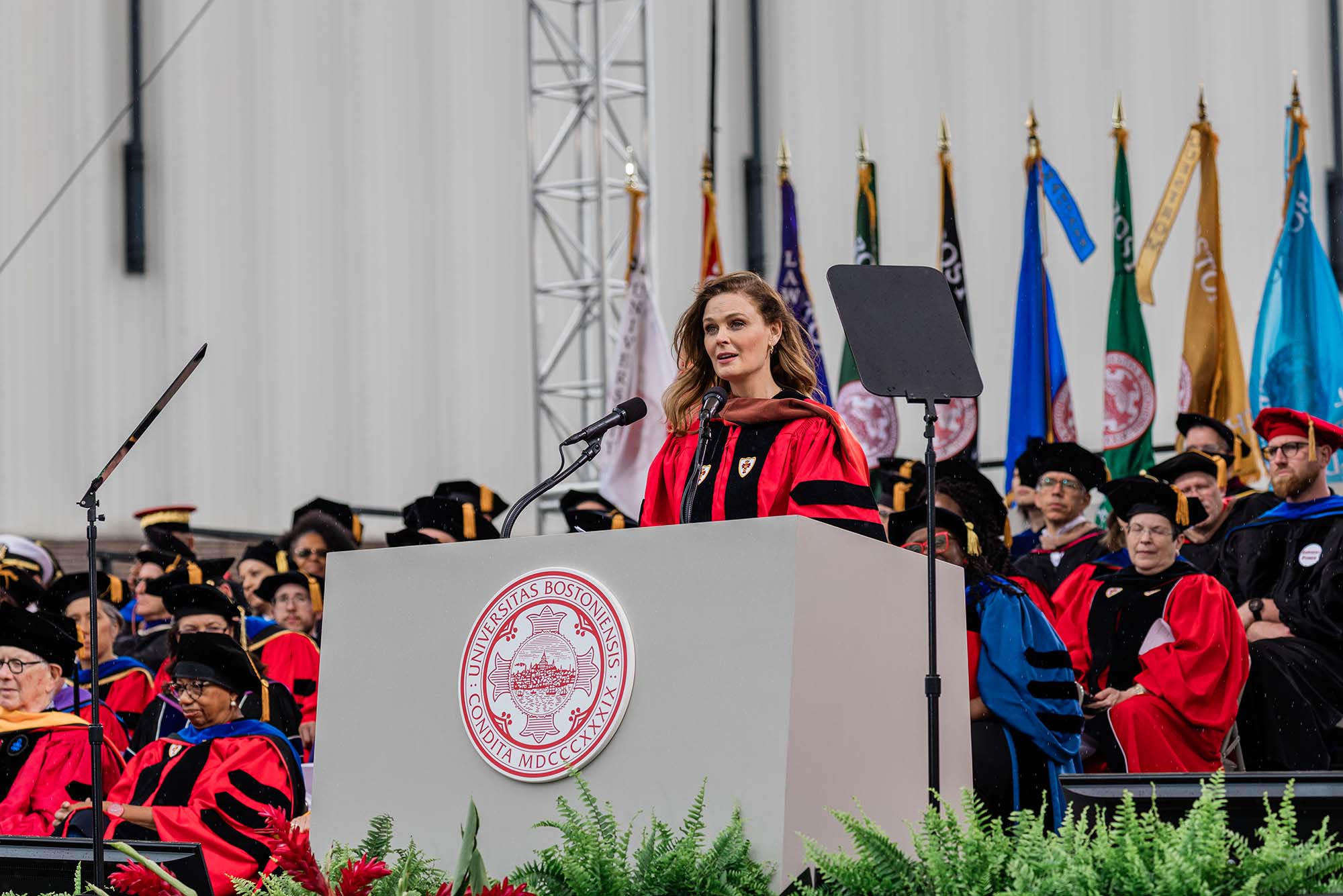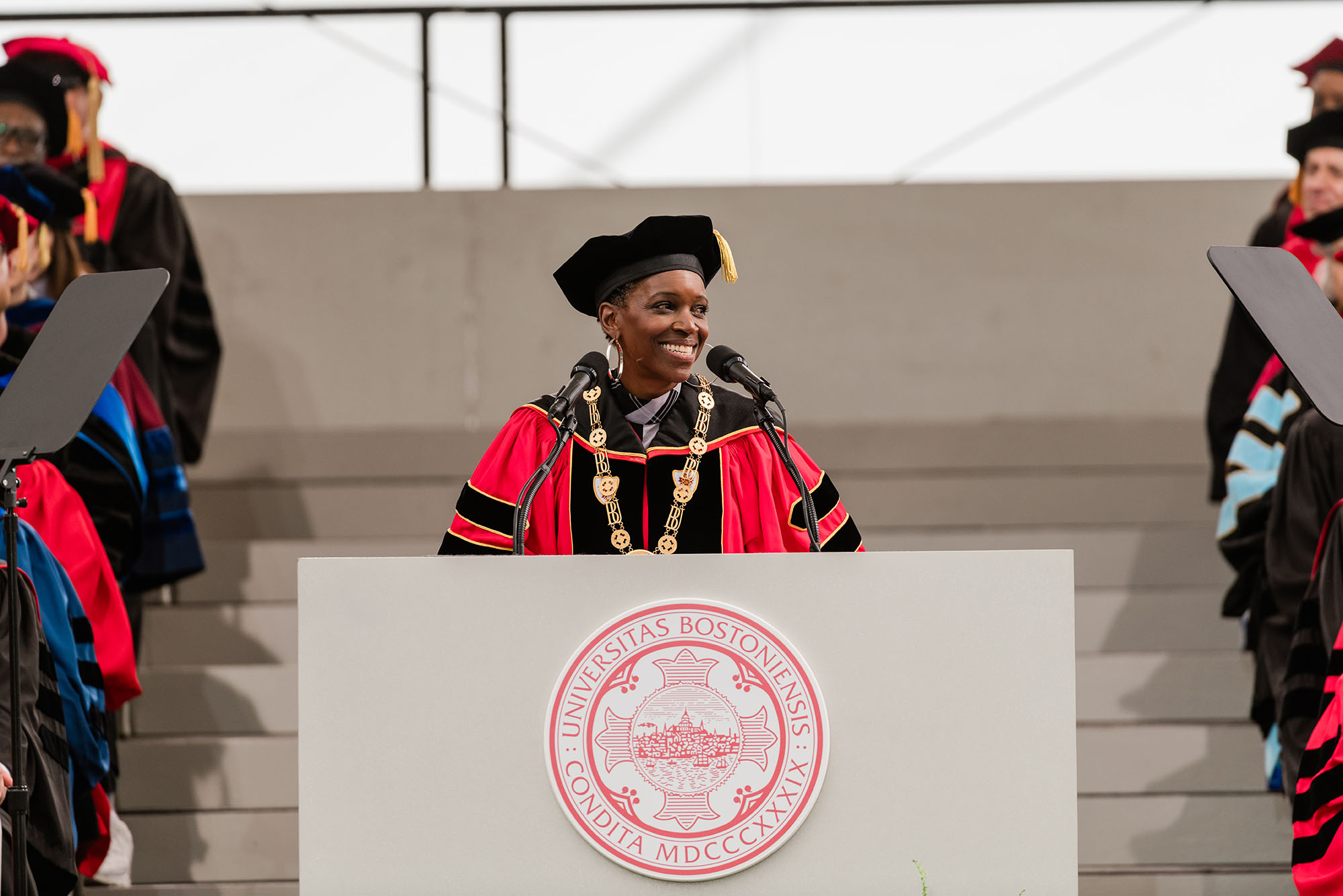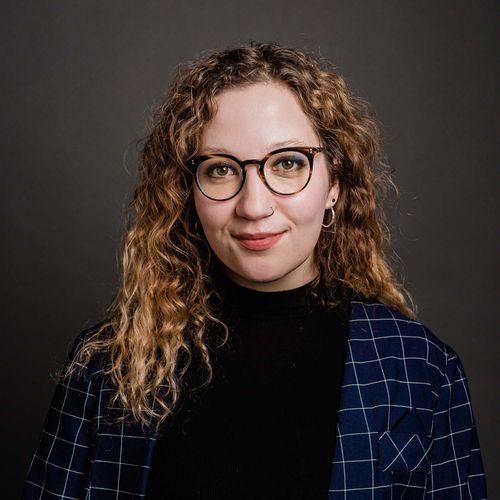“Empathy Is Essential,” BU Commencement Speaker Emily Deschanel Tells 2025 Graduates
Boston University President Melissa Gilliam, at jubilant 152nd Commencement, says the Class of 2025 should “go out into the world, confident that you have the tools to pursue excellence”

The Class of 2025 celebrating as Boston University’s 152nd Commencement concludes, May 18. Photo by Janice Checchio
“Empathy Is Essential,” BU Commencement Speaker Emily Deschanel Tells 2025 Graduates
University President Melissa Gilliam, leading BU’s 152nd Commencement, and her first, tells the Class of 2025: “go out into the world, confident that you have the tools to pursue excellence”
Over a three-decade acting career, Boston University alum Emily Deschanel has played a serial killer, a heroin addict, an ex-con, a lawyer, a doctor, a CEO, and wives of equally numerous fictive husbands. But she’d never played a graduation speaker until Sunday, May 18, she told the thousands attending the 152nd All-University Commencement, calling BU “the greatest school on God’s green earth.”
Addressing the largest University Commencement crowd in 30 years, one of the largest graduating classes in BU’s history, and the first Commencement overseen by BU President Melissa Gilliam, Deschanel (CFA’98), also an environmentalist and animal rights activist, quipped, “I’m not a brilliant mind. I just played them on TV.” She then delivered a lighthearted, but heartfelt exhortation to the Class of 2025, urging them to embrace empathy for others, and for themselves, a skill she said actors learn in order to fully inhabit their characters.
In presiding over the day’s proceedings at Nickerson, Gilliam, beaming widely as she entered the field with the procession, awarded Deschanel an honorary Doctor of Fine Arts. Citing Deschanel’s wide range of roles, the president added, “Your commitment to vital causes related to women’s rights, climate change, and animal welfare embodies Boston University’s values of service and creating a better world for all.” The vegan actor has served on the board of Farm Sanctuary, a farm animal protection organization, and helped found the Women’s Climate Alliance for Mercy Corps, which helps girls and women affected by climate change.
And addressing the graduating students, Gilliam told them to remember the support system around them: “I encourage you to face the future with courage and purpose. Because you have tremendous support. Look around you, there is a network of people who are here for you. You are graduating into one of the largest global alumni networks there is.”
But she also acknowledged their potential fears over the “uncertain times” they were entering. She recalled the late Marsh Chapel dean and leading civil rights voice of the Rev. Howard Thurman (Hon.’67), the first black dean at a mostly white American university: that finding meaning and good in life helps to overcome anxiety.
“This University, with its commitment to knowledge, education, and service to society…imbues you with values that you can turn to when you feel adrift,” she said. “Go out into the world, confident that you have the tools to pursue excellence, wherever you may decide to go.”
Go out into the world, confident that you have the tools to pursue excellence, wherever you may decide to go.
Deschanel also encouraged them to be confident—but to never lose sight of the need for empathy.
“Empathy isn’t weakness,” she told the 4,000 graduates and more than 20,000 guests gathered on Nickerson Field, as well as an overflow crowd at nearby Agganis Arena, on a cloudy and windy afternoon that sprinkled light rain briefly during her remarks. (The full Class of 2025, including those who did not attend Sunday’s ceremony, totals almost 8,000.)
“It’s not about letting people off the hook for their behavior and choices. It’s about understanding what led to those choices so you can decide how to respond from a place of authenticity,” Deschanel said.

Along with references to her days getting late night-food at T. Anthony’s and sneaking friends into Claflin Hall, Deschanel drew lessons from her acting career for the graduates. She recalled the first season of Bones, the hit Fox police procedural in which she played a forensic anthropologist. Long filming days, medical jargon-laden scripts, and sleepless nights as she labored over her breakout role left her stressed. Studio executives voiced unhappiness with her work. When they joined a party on set to celebrate her birthday, Deschanel, aware of their displeasure, burst into tears and ran off, convinced she’d be fired.
Instead, Bones showrunner Hart Hanson, who was under similar stress himself, came to her trailer and comforted her. “Our business is filled with bombastic personalities—narcissists. Hart wasn’t like that,” Deschanel told her BU audience. “Hart had shown empathy—and in doing so, he created an environment where I could actually succeed.”
To manage guest attendance, this year’s Commencement was the first to require guests to have tickets (supplied free) to attend the ceremony. The event drew a larger crowd than anticipated, and despite additional seats added to Nickerson Field as the ceremony began, some guests had to be directed to Agganis Arena to watch a livestream of the ceremony.
The unusually numerous throng listening to Deschanel owed to the fact that the Class of 2025 “was the largest we’ve had in a while,” according to Derek Howe (Questrom’92), BU’s senior vice president for operations. “We expected a large turnout.”


“Typically, we see a 70 percent response rate” in terms of graduates and guests who indicate they’ll attend the ceremony. This year’s rate was higher, which guaranteed thunderous applause from the graduates when Bean, BU’s lovable community resource dog, was flashed on the field’s screen.
The sea of scarlet-robed graduates parading slowly onto the field to the brass accompaniment of Pomp and Circumstance telegraphed the solemn nature of the proceedings.
The outdoor Commencement followed the Baccalaureate ceremony at Marsh Chapel, where the speaker, Bishop Thomas J. Bickerton, a BU trustee and resident bishop of the New England Conference of the United Methodist Church, touched on the need for new voices to speak up and confront the challenges before them.
Gilliam also awarded honorary degrees to health and science journalist and physician Sheri Fink, Doctor of Science; Rebeca Martinez (LAW’92), chief justice of Texas’ Fourth Court of Appeals and a member of the School of Law dean’s advisory board, Doctor of Laws; photographer Dominic Moulden, documentarian of Black resilience against racism, Doctor of Humane Letters; and Sheldon Lee Glashow, a BU professor emeritus of physics and 1979 Nobel laureate in physics, Doctor of Science.

During the ceremony Gilliam presented BU’s highest teaching honors, the Metcalf Cup and Prize for Excellence in Teaching and the Metcalf Award for Excellence in Teaching. The Metcalf Cup and Prize was awarded to Tina Durand, a clinical associate professor of counseling psychology and applied human development at Wheelock College of Education & Human Development. The Metcalf Award went to Michelle Sullivan, a professor of the practice of mass communication, advertising, and public relations at the College of Communication.
Student speaker Jason Wexler (COM’25) acknowledged the uncertain times of the moment.
Wexler recalled how his class had faced the unforeseeable challenge of being the first to return to residence on campus following the remote learning period forced by the COVID-19 pandemic. “We said yes to showing up no matter what,” a can-do attitude he personally adopted when he joined the Hawaiian Cultural Association, despite not being Hawaiian, to learn about a different culture, and when he auditioned for an all-women play. (They said “no,” but it led to an audition for a BU a cappella group that said “yes.”)
“Keep saying yes, even when things seem uncertain,” Wexler urged. “We can do anything as long as we stay open to the positivity that those three letters contain.”

At the normally contemplative Baccalaureate Service at Marsh Chapel before Commencement, Bishop Thomas J. Bickerton, spiritual leader of the Methodist conferences of New York and New England, used his address to touch on the need for new voices to speak up and confront the challenges before them, without mentioning politics or parties specifically.
Playing off an earlier reading from Ecclesiastes 3:1-8—“for everything there is a season”—Bickerton invoked climate change in describing a changing season of “tornados, floods, record temperatures.”
If you turn on the news, he said, you’ll inevitably hear “about how we might change policies, executive orders, tariffs, retribution, equalization. I’m not sure what season we are in right now. Quite honestly, I can’t figure it out, but it is a season. My gosh, what a season, where we have moved from the predictable to the unpredictable, from the recognizable to the unrecognizable, from the calming of the storm to the creation of one new storm after another.”
He spoke of his work with a church initiative called Imagine No Malaria, and the many partnerships that made it a success—with the Gates Foundation, the National Basketball Association, the WNBA, the UN Foundation, and “a tiny little partner called USAID.”
The initiative helped reduce malaria deaths by 50 percent, “but now malaria prevention is eliminated, USAID is gone,” he said.
“It is a season where the storms are so violent that we’ve not just lost a handle on certain programs, we’ve lost sight of some simple words.”
Those words, he said, are diversity, equity and inclusion: “Three simple words that, when effectively used and implemented, bring about the world that was meant to be, a world that honors the amazing and unbelievable power of a creative God, a world that not only sees the good, but works tirelessly to make that good happen, a world that when those words are used, a sense of purity or holiness begins to emerge.”
In a time of discouragement, he said, “There is a need, as there always has been, a need for voices to emerge that signal a new day,” invoking Martin Luther King, Jr. (GRS’55, Hon.’59), one of BU’s most notable alums, as well as words from Grammy-winning artist Alicia Keys from her Broadway show Hell’s Kitchen.
“This season that we are living in is a time when people are looking for a voice of possibility, a word of hope, a path to a new day, a time when there is a longing to believe in something, something that will make a difference, something that can point us in the direction of that which is good and right and holy,” he said.
His address earned the service’s first applause.
Rev. Robert Allan Hill, dean of Marsh Chapel, presided over the Baccalaureate service, which included Bible readings by Provost Gloria Waters (the Ecclesiastes) and Gilliam.
At Nickerson, Gilliam sent the graduates into the world with one final request of them: “Again, my most sincere congratulations,” she said. “This is a joyous day! Celebrate all that you have accomplished with your loved ones—you have earned this.”



Comments & Discussion
Boston University moderates comments to facilitate an informed, substantive, civil conversation. Abusive, profane, self-promotional, misleading, incoherent or off-topic comments will be rejected. Moderators are staffed during regular business hours (EST) and can only accept comments written in English. Statistics or facts must include a citation or a link to the citation.